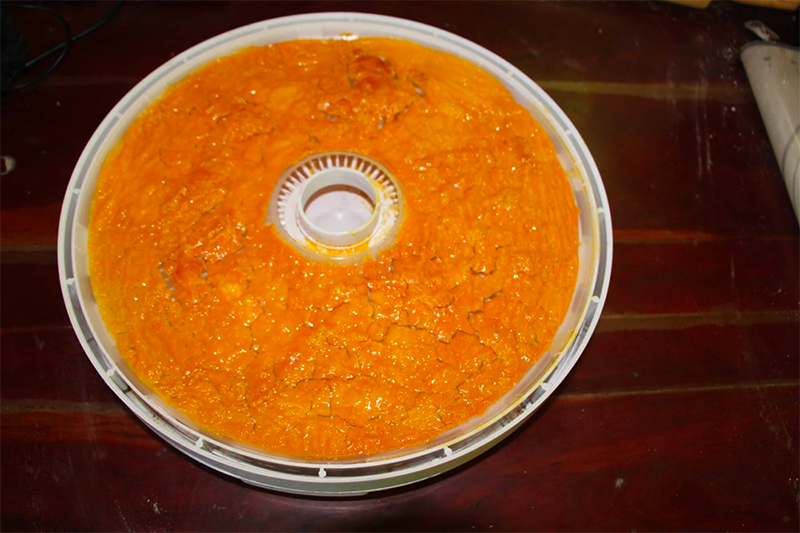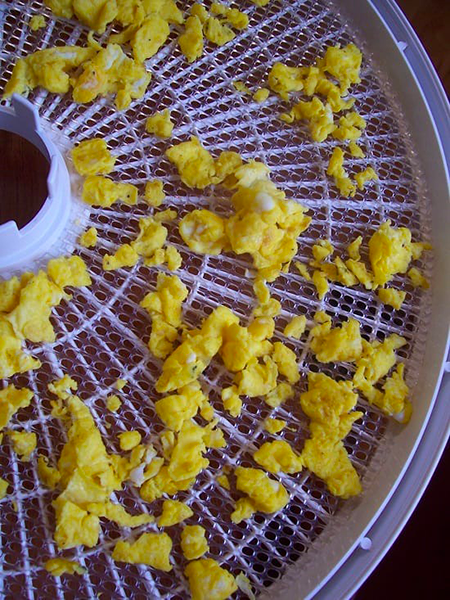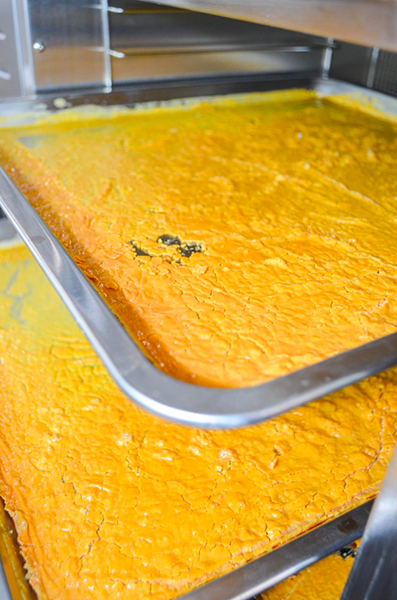
Content Menu
● Understanding Food Dehydrators
● Why Dehydrate Eggs?
● How to Dehydrate Eggs in a Food Dehydrator
>> Step-by-Step Process
● Safety Tips When Dehydrating Eggs
● Rehydrating Dehydrated Eggs
● Benefits of Using a Food Dehydrator
● Different Methods of Dehydrating Eggs
>> Cook-Dry Method
>> Wet-Dry Method
● Tips for Successful Egg Dehydration
● Conclusion
● FAQ
>> 1. Can I dehydrate raw eggs?
>> 2. How do I store dehydrated eggs?
>> 3. Can I use an oven instead of a dehydrator?
>> 4. How long do dehydrated eggs last?
>> 5. What is the best way to rehydrate powdered eggs?
● Citations:
Dehydrating food has become increasingly popular, especially among those looking to preserve their food for long periods. One of the most versatile foods that can be dehydrated is eggs. This article explores the process of dehydrating eggs using a food dehydrator, the benefits, and some tips to ensure safety and quality in your dehydrated egg products.

Understanding Food Dehydrators
A food dehydrator is a kitchen appliance designed to remove moisture from food, thereby preventing spoilage and extending shelf life. It works by circulating warm air around the food at low temperatures, which helps retain nutrients while drying out the moisture.
- Temperature Control: Most food dehydrators operate between 85°F to 160°F (29°C to 71°C), making them ideal for drying delicate foods like fruits and vegetables without cooking them.
- Energy Efficiency: Dehydrators generally consume less energy than conventional ovens, making them a cost-effective option for preserving food.
- Versatility: Besides eggs, you can dehydrate a variety of foods including fruits, vegetables, herbs, and meats.
Why Dehydrate Eggs?
Dehydrating eggs offers several advantages:
- Long Shelf Life: Dehydrated eggs can last up to 10 years when stored properly, making them an excellent choice for long-term food storage.
- Convenience: They are lightweight and easy to transport, making them perfect for camping or emergency preparedness.
- Cost-Effective: Making your own dehydrated eggs can save money compared to purchasing commercially dried products.
How to Dehydrate Eggs in a Food Dehydrator
Step-by-Step Process
1. Preparation:
- Start with fresh, pasteurized eggs. If using farm-fresh eggs, pasteurize them by heating to 140°F (60°C) for three minutes.
- Crack the eggs into a bowl and whisk until fully blended.
2. Setting Up the Dehydrator:
- Preheat your dehydrator to 135°F (57°C) or 140°F (60°C). The exact temperature may vary based on your specific dehydrator model.
- Use fruit leather trays or non-stick sheets to prevent the egg mixture from sticking.
3. Pouring the Mixture:
- Spread a thin layer of the egg mixture evenly across the trays. Avoid pouring too thickly as this can lead to uneven drying.
4. Dehydration Time:
- Dehydrate for approximately 8 to 12 hours. Check periodically; the eggs should be completely dry and brittle when finished.
5. Cooling and Grinding:
- Once dried, let the eggs cool completely before grinding them into a fine powder using a blender or food processor.
6. Storage:
- Store the powdered eggs in airtight containers with oxygen absorbers to prolong shelf life.
Safety Tips When Dehydrating Eggs
- Avoid Seasoning: Do not add salt or other seasonings before dehydrating as they can affect preservation.
- Watch for Salmonella: Always use pasteurized eggs to minimize the risk of salmonella poisoning.
- Proper Storage: Ensure that dehydrated eggs are stored in a cool, dark place in airtight containers.
Rehydrating Dehydrated Eggs
To use dehydrated eggs in cooking:
1. Mix one tablespoon of egg powder with 1.5 tablespoons of water.
2. Allow it to sit for about 5–10 minutes before using it as you would fresh eggs in recipes.

Benefits of Using a Food Dehydrator
Using a food dehydrator has numerous benefits beyond just drying eggs:
- Nutrient Preservation: Unlike boiling or frying, dehydration retains most nutrients found in food.
- Cost Savings: Reduces waste by allowing you to preserve excess produce or leftovers.
- Healthy Snacks: Create nutritious snacks such as dried fruits or vegetable chips without added preservatives or sugars.
Different Methods of Dehydrating Eggs
While using a food dehydrator is one of the most effective methods for dehydrating eggs, there are alternative techniques worth noting:
Cook-Dry Method
This method involves cooking the eggs first before drying them:
1. Crack fresh eggs into a bowl and whisk thoroughly.
2. Cook them in a non-stick pan without oil until they are fully scrambled.
3. Spread the cooked eggs onto dehydrator trays and set the temperature to around 145°F (63°C).
4. Dry for about 4–6 hours until they are completely dry and crumbly.
5. Cool and grind into powder as needed.
This method is quicker but may not yield the same texture as raw egg dehydration.
Wet-Dry Method
The wet-dry method is often preferred for its superior results:
1. Whisk raw eggs thoroughly until well blended.
2. Pour the mixture onto fruit leather sheets in your dehydrator.
3. Set your dehydrator to approximately 135°F (57°C) and dry for about 10–12 hours.
4. Once dry, cool and grind into powder.
This method allows for better flavor retention and texture when reconstituted.
Tips for Successful Egg Dehydration
- Choose Quality Eggs: Always select fresh, high-quality eggs free from cracks or defects for optimal results.
- Avoid Fats: Do not add oils or dairy products when preparing eggs for dehydration; these can reduce shelf life significantly.
- Monitor Drying Time: Environmental factors such as humidity can affect drying times; always check periodically until fully dried.
Conclusion
Dehydrating eggs in a food dehydrator is not only feasible but also beneficial for long-term storage and convenience. With proper techniques and safety measures, you can enjoy homemade powdered eggs that are perfect for various recipes or emergency supplies.
The versatility of dehydrated eggs makes them an excellent addition to any kitchen pantry—ideal for baking, cooking, camping trips, or simply reducing food waste at home. As more people seek sustainable ways to manage their food supplies, understanding how to dehydrate foods like eggs becomes an invaluable skill.

FAQ
1. Can I dehydrate raw eggs?
Yes, you can dehydrate raw eggs by whisking them thoroughly and spreading them on trays in a dehydrator set at 135°F (57°C) for about 8–12 hours until completely dry.
2. How do I store dehydrated eggs?
Store dehydrated egg powder in airtight containers with oxygen absorbers in a cool, dark place to maximize shelf life.
3. Can I use an oven instead of a dehydrator?
Yes, you can use an oven set at its lowest temperature with the door slightly ajar; however, this method may not yield consistent results compared to a dedicated dehydrator.
4. How long do dehydrated eggs last?
When stored properly in airtight containers, dehydrated eggs can last up to ten years.
5. What is the best way to rehydrate powdered eggs?
Mix one tablespoon of egg powder with 1.5 tablespoons of water and let it sit for about 5–10 minutes before using it in cooking.
Citations:
[1] https://www.backdoorsurvival.com/how-to-dehydrate-eggs/
[2] https://www.dehydratedelight.com/basics/how-to-dehydrate-egg-yolks/
[3] https://www.onegoodthingbyjillee.com/make-powdered-eggs/
[4] https://www.scouterlife.com/blog/2020/7/14/how-to-make-dehydrated-eggs
[5] https://www.easy-food-dehydrating.com/dehydrate-eggs-safely.html
[6] https://www.littlehouseliving.com/dehydrated-eggs-make.html
[7] https://www.backcountrypaleo.com/egg-cellent-dehydrated-eggs/
[8] https://www.backwoodshome.com/dehydrating-eggs-at-home/
[9] https://www.theprairiehomestead.com/2011/12/how-to-dehydrate-eggs-or-not.html
[10] https://thehomesteadinghippy.com/dehydrating-eggs-for-longer-storage/











